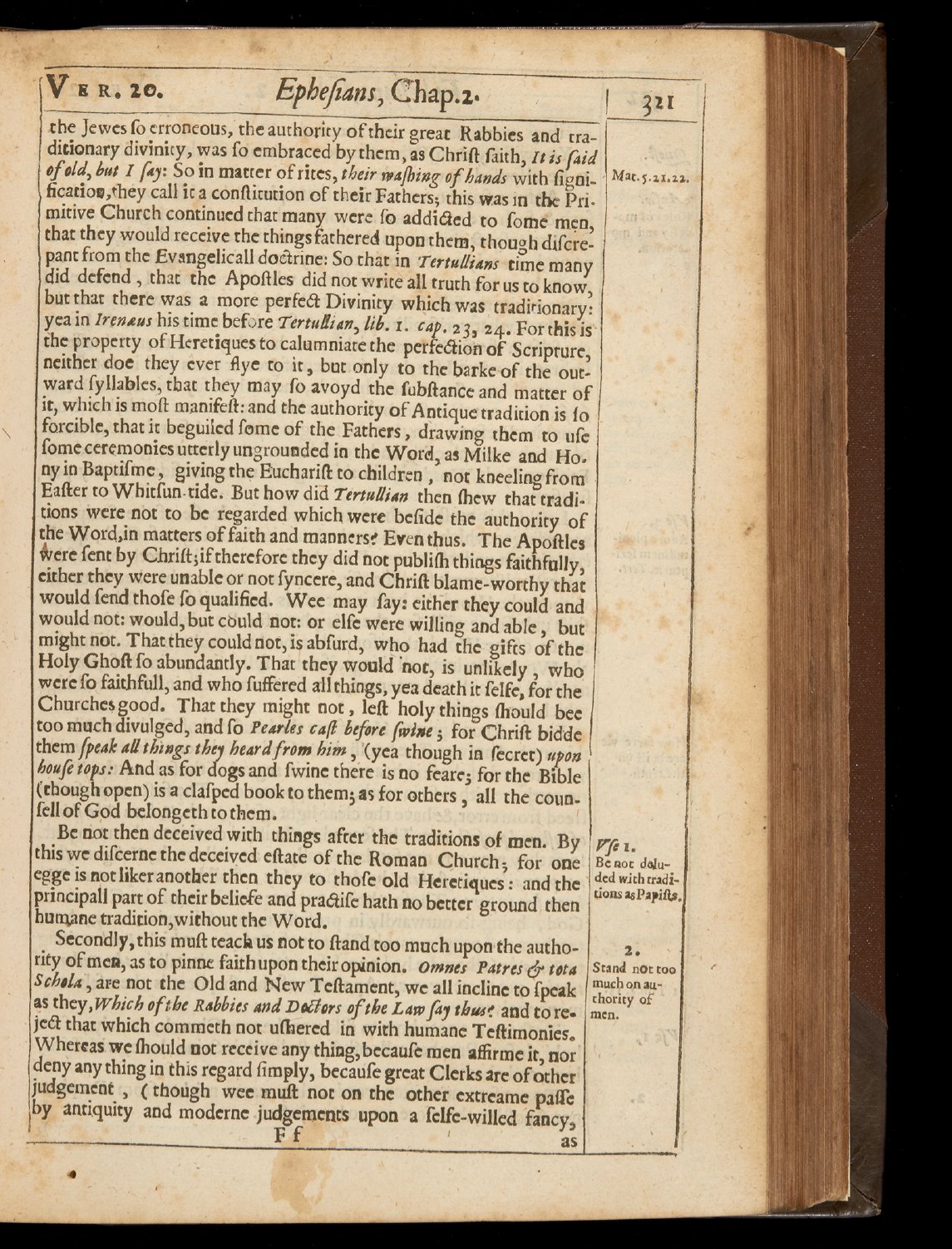

`TER.
zv.
Ephefaans,
Chap.z.
311
the
Jewes
fo
erroneous, the authority
of
their great Rabbies and tra-
ditionary divinity,
was fo
embraced by them
,
as
Chrìft
faith,
It
is
lid
ofold,
but
I
fay:
So
in
matter
of
rites,
their
ma/hing
of
hands
with figni-
ficatioa,chey
call
it
a
conflicution
of
their
Fathers;
this was in
the Pri-
mitive
Church
continued that many were
fo
addicted to fome men,
that
they
would
receive
thethings
fathered upon them,
though
difcre-
pant from
the
Evangelical] doctrine:
So
that
in
Tertulians time many
did
defend
,
that the Apoftles
did
not write all truth
for
us
to know,
but
that there
was a
more
perfe&
Divinity which
was
traditionary:
yea
in
Irenaus
his
time before
Tertulian,
lib.
z. cap.
23,
24. For
this
is
the property
of
Heretiques to calumniate the
perfet`tion
of
Scripture,
neither
doe
they ever
flye
to
it,
but only
to
the barke
of
the
out-
ward fyllables,
that they
may
fo
avoyd the
fub(tance and
matter
of
it,
which
is
moil
manifeft: and
the authority
of
Antique tradition
is
fo
forcible,
that
it beguiled fome
of
the Fathers
,
drawing them to
ufe
fome
ceremonies utterly ungrounded
in
the
Word,
as
Milke and
Ho.
ny
in
Baptifme,
giving
the
Eucharift to children
,
not
kneeling
from
Fatter
to
Whitfun
-tide. But
how
did
Tertulian
then thew
that tradi-
tions were
not to
be regarded which were befide
the authority
of
the
Word,in
matters
of
faith
and
mannersf Even thus.
The
Apoftles
Nere fent by
Chrift;iftherefore
they
did
not
publith things faithfully,
either
they
were unable or
not
fyncere, and
Chrilt
blame
-
worthy that
would
fend
thofe
fo qualified.
Wee
may fay: either
they
could and
would not: would, but could
not:
or
elfe
were willing
and
able,
but
might not.
That
they
could
not,
is
abfurd, who had
the
gifts
of
the
Holy Ghoft
fo
abundantly.
That
they would not,
is
unlikely ,
who
were
fo
faithful!, and
who
fuffered all
things, yea death
it felfe,
for the
Churches
good. That they
might
not
,
left
holy things
Mould bee
too
much divulged, and
fo Peones call
before
[wise; for Chrift
bidde
them
[peak
all things
they
heard
from
him
(yea though
in
fecret)
upon
houfe
tops:
And
as
for dogs and
fwine
there
is
no feare; for
the
Bible
(though
open)
is a
clafped
book to
them;
as
for
others
,
all
the
coun-
fell
of
God belongethto them.
Be
not then
deceived with things
after the traditions of men.
By
yf
r,
this we difcerne
the
deceived
ettate
of
the Roman
Church;
for one
Be noe
doto-
egge
is
notlikeranother then they to thofe old Heretiques:
and
the
dedw,thtrada-
principall part
of
their
beliefe
and
pralife
hath no better ground then
nano
PaP''
humane
tradition,without the
Word.
Secondly,this
muff
teach
us
not to
Eland
too much
upon
the autho-
2.
rity
of
men,
as
to
pinne faithupon
their opinion.
omnes Patres
tota
Stand nor
too
much
on au-
Schola
, are not
the Old
and
New
Teftament,
we
all incline
to
fpeak
charity
of
as
they,Which ofthe
Rabbits
and Dollars ofthe Law
fay
thus! and
tore.
men.
jeél
that which commeth not
ufbered
in
with humane Teftimonies.
Whereas we
Ihould
not
receive any
thing,bccaufe men
affirme
it, nor
deny
any thing in this
regard limply, becaufe great Clerks are
of
other
judgement , (
though
wee mutt
not
on
the
other
extreame
paffe
lby antiquity and
moderne judgements upon
a
felfe-
willed
fancy,
F
Mat.ç.zr.za.
as

















